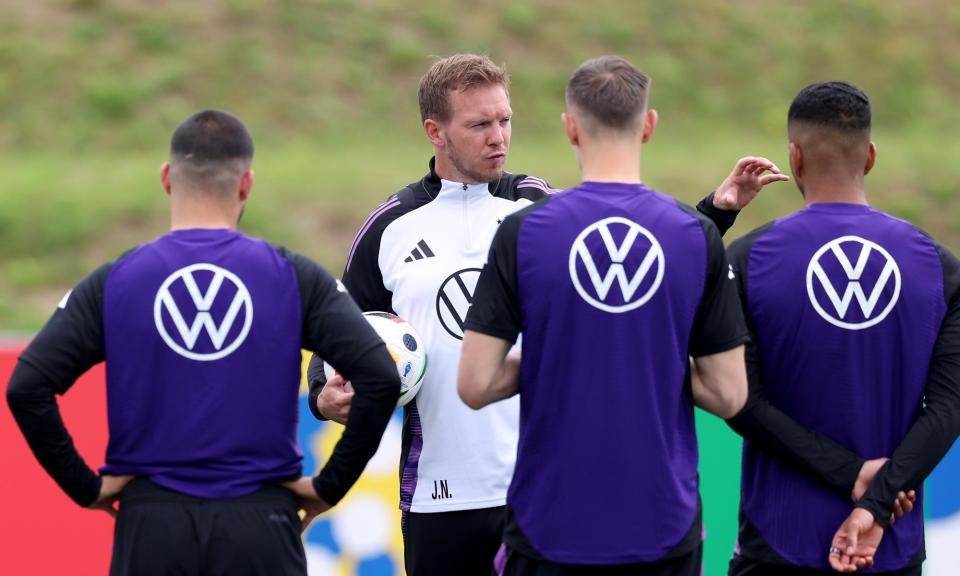Nagelsmann out to balance solidity and style as Germany show rolls on

In the months leading up to Euro 2024, we heard a lot about the German passion for “das Public Viewing”. Interviews with players would frequently lapse into nostalgic childhood memories of watching the 2006 World Cup in parks or town squares. Friends enthused about the way whole neighbourhoods would come to life in tournament summers, joined together in what was by now an authentically German cultural experience. You’d smile, and nod, but silently you’d think: “All right pal, we’ve all seen a big screen before.”
Then, around the start of June, the screens started to spring up. Not only the big set-piece screens outside the Reichstag and the Brandenburg Gate, but smaller screens, everywhere. The local kebab place with three tables has a screen up. The local Italian restaurant that doesn’t take credit cards has somehow summoned the technological expertise to attach a 75-inch ultra HD television to the side of the building. The Spätis – basically off-licences – have screens outside with benches where you can sit with cans. The newspaper stand across the road has installed a screen and six deckchairs.
Related: It’s party time in Germany with young stars Musiala and Wirtz calling the tune | Philipp Lahm
Unlike in England, where public viewing is basically seen as a monumental nuisance, and thus purposely restricted to those with the means to book ahead and pay £17 for a burger, the profit motive is not the prevailing factor here. How many extra newspapers can one stand really sell, anyway? The point is congregation, shared experience, football as a focal point to bring people together, with the instinctive assumption that this is a good thing.
Now Germany has a team, and a vibe, worth congregating for. The swell of optimism has been swift to materialise: according to the pollster Civey, 35% of German fans believe Julian Nagelsmann’s team will win Euro 2024, as opposed to 15% before the opening game against Scotland. As defender Jonathan Tah put it this week: “You can tell that something is happening.”
For their part, the squad is in no mood to dampen expectations. “The fans can dream, our job is to let them keep dreaming,” Nagelsmann said after the 2-0 win over Hungary on Wednesday. “Our job is to ignite the euphoria,” said Ilkay Gündogan. “Then when we see the enthusiasm of the fans on the streets, or in the stadium, of course it pushes us even more on the pitch.”
Many of the problems that seemed to be plaguing the DFB-Elf before the tournament have evaporated. The lack of centre-forward options has been neatly answered by a haul of seven goals in two games. A new defensive solidity was borne out by the win over Hungary, which – as Antonio Rüdiger was astonished to discover – was Germany’s first clean sheet at a major tournament for eight years. Toni Kroos is still resolutely Toni Kroos.
Now to Frankfurt on Sunday night, where Germany will play Switzerland requiring a draw to top Group A and send into the round of 16 on a wave of good tidings.
The surface at the Frankfurt Arena is the same turf that cut up badly during England’s game against Denmark on Thursday, a pitch Nagelsmann described as “a disaster” after a friendly against the Netherlands in March. On Saturday he voiced fears that it could cause injuries. “I hope that it holds up, but I have little hope,” he said. “The grass is simply not good - very greasy, very soft. It is like driving with summer tyres in the winter.”
The problems, it is said, stem back to the two NFL games in November. Such was the damage inflicted on the turf that the pitch had to be relaid in the middle of winter, whereupon it was immediately drenched by weeks of heavy rainfall. The effect on Germany’s quick passing game should be minimal but realise: qualification may already be secure, but the potential for a slip still exists, literally as well as figuratively.
There are balances for Nagelsmann to strike. Between continuity and rotation: with Rüdiger, Tah, Maximilian Mittelstädt and Robert Andrich one yellow card away from suspension, changes in the defence are a possibility.
Between conviction and complacency: as a visiting journalist grumbled on Friday, the first mention of Switzerland took 23 minutes. Above all between solidity and style, between the job that needs to be done, and the knowledge of what it would mean to complete it. After all, if everyone is watching, you may as well try to put on a show.

 Yahoo Sport
Yahoo Sport 






































